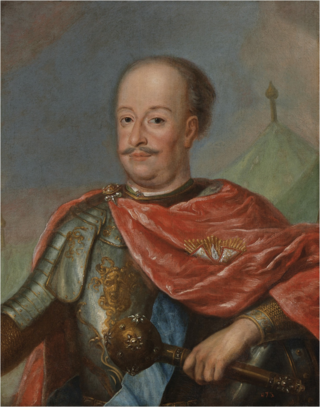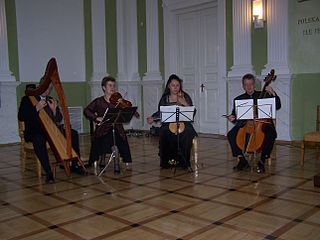
Sigismund II Augustus was King of Poland and Grand Duke of Lithuania, the son of Sigismund I the Old, whom Sigismund II succeeded in 1548. He was the first ruler of the Polish–Lithuanian Commonwealth and the last male monarch from the Jagiellonian dynasty.

Sieradz is a city on the Warta river in central Poland with 40,891 inhabitants (2021). It is the seat of the Sieradz County, situated in the Łódź Voivodeship. Sieradz is a capital of the historical Sieradz Land.

The House of Radziwiłł is a Polish princely family of Lithuanian origin, and one of the most powerful magnate families originating from the Grand Duchy of Lithuania and later also prominent in the Crown of the Kingdom of Poland.

Mikołaj Radziwiłł, nicknamed the Red, was a Polish-Lithuanian nobleman, voivode of Vilnius, Grand Chancellor of Lithuania, and Grand Lithuanian Hetman in the Grand Duchy of Lithuania and later in Polish–Lithuanian Commonwealth. Together with his cousin Mikołaj "the Black" Radziwiłł and the Radziwiłł family were granted title and position as Prince of the Holy Roman Empire.

Mikołaj Krzysztof Radziwiłł, nicknamed the Black, was a Lithuanian and Polish noble who held several administrative positions within the Grand Duchy of Lithuania, including the Voivode of Vilnius, Grand Lithuanian Chancellor, and the Grand Hetman of Lithuania. He was also Reichsfürst (Prince) of the Holy Roman Empire.

Barbara Radziwiłł was Queen of Poland and Grand Duchess of Lithuania as consort of Sigismund II Augustus, the last male monarch of the Jagiellon dynasty. Barbara, a great beauty and already widowed, became a royal mistress most likely in 1543 and they married in secret in July or August 1547. The marriage caused a scandal; it was vehemently opposed by Polish nobles, including Queen mother Bona Sforza. Sigismund Augustus, assisted by Barbara's cousin Mikołaj "the Black" Radziwiłł and brother Mikołaj "the Red" Radziwiłł, worked tirelessly to gain recognition of their marriage and to crown Barbara as Queen of Poland. They succeeded and Barbara's coronation was held on 7 December 1550 at Wawel Cathedral. However, her health was already failing and she died just five months later. Even though it was brief, her reign propelled the Radziwiłł family to new heights of political power and influence.

Adam Mikołaj Sieniawski (1666–1726) was a Polish nobleman, aristocrat and military leader.

Olyka is a rural settlement in Lutsk Raion, Volyn Oblast, western Ukraine. It is located east of Lutsk on the Putylivka Rriver. Its population is 3,032.

Prince Krzysztof Radziwiłł, epithet "Piorun" ("Lightning") was a Reichsfürst of the Holy Roman Empire and a member of the nobility of the Polish–Lithuanian Commonwealth.

Prince Mikołaj Krzysztof Radziwiłł and nicknamed "the Orphan", was a Polish–Lithuanian nobleman (szlachcic), Ordynat of Nyasvizh from 1586, Court Marshal of Lithuania from 1569, Grand Marshal of Lithuania from 1579, castellan of Trakai from 1586, voivode of Trakai Voivodeship from 1590, voivode of Vilnius Voivodeship from 1604 and governor of Šiauliai. After the treaty at Vienna in 1515 all Radziwills were Imperial Princes and he held a position as Imperial Prince of the Holy Roman Empire.

Mikołaj Mielecki h. Gryf was a Polish nobleman and politician. Since 1569 Mielecki was the voivod of Podolian Voivodship, between 1578 and 1580 he also served in the Polish Army as the Grand Hetman of the Crown.

Mikołaj Rej or Mikołaj Rey of Nagłowice was a Polish poet and prose writer of the emerging Renaissance in Poland as it succeeded the Middle Ages, as well as a politician and musician. He was the first Polish author to write exclusively in the Polish language, and is considered, to be one of the founders of Polish literary language and literature.

The Polish Reformed Church, officially called the Evangelical Reformed Church in the Republic of Poland is a historic Calvinistic Protestant church in Poland established in the 16th century, still in existence today.

The Kraków Voivodeship was a voivodeship (province) in the Kingdom of Poland from the 14th century to the partition of Poland in 1795. Located in the southwestern corner of the country, it was part of the Lesser Poland region and the Lesser Poland Province.

Mikołaj II Radziwiłł (1470–1521), nicknamed Amor Poloniae, was a magnate and statesman of the Grand Duchy of Lithuania.

Jan Hieronimowicz Chodkiewicz was a 16th-century Lithuanian noble. He was Grand Pantler of Lithuania from 1559, Elder of Samogitia (1564–1579), Governor of Livonia (1566–1578), Grand Marshal of Lithuania (1566–1579), Count of Shklow 1568, Castellan of Vilnius (1574–1579). He was the elder of Telšiai and Plateliai from 1566, of Rumšiškės from 1568, and of Kaunas from 1569.

Stanisław "the Pious" Radziwiłł was a sixth generation Radziwill family noble (szlachcic) of the Grand Duchy of Lithuania in the Polish–Lithuanian Commonwealth. He was a Elder of Samogitia, a first ordynat of Olyka, and the Great Lithuanian Marshal.

Ars Nova is a Polish early music instrumental ensemble founded in Warsaw in 1981 by Jacek Urbaniak.
Mikołaj z Szadka Prokopowicz (1489–1564) was a Polish academic.

















